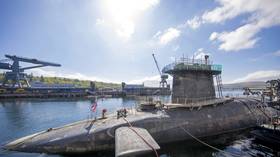Microchip factory closing puts UK defense projects at risk – Telegraph

The British military is bracing for supply disruptions after one of the UK’s last microchip plants lost its Apple contract and ceased taking new orders, according to the Daily Telegraph.
The US-based company Coherent has a production facility in Newton Aycliffe, Country Durham. Its clients include the Italian defense giant Leonardo, which makes radars, electronic warfare systems and helicopters for the UK.
“The factory’s closure threatens to reduce the UK’s domestic capabilities,” and could make Leonardo turn elsewhere for supplies, the Telegraph reported on Tuesday.
Coherent “is not thought to have any outstanding orders” with Leonardo, according to the Telegraph, but sources told the newspaper that the plant may be needed in the future for unspecified projects.
The Newton Aycliffe plant is one of just two in the UK that can commercially produce gallium arsenide semiconductors, the newspaper noted. It has made chips for British military hardware, such as the radar power amplifiers in Eurofighter Typhoon jets. Leonardo produces about 60% of the avionics for the Typhoon, according to its website.
Coherent built up its business making semiconductors for Apple. Earlier this year, however, the US tech giant announced it would make changes to the FaceID feature in the upcoming iPhone model, meaning that Coherent’s chips were no longer needed.
Coherent UK announced in May that it had stopped deliveries to a “major customer” at the end of the 2023 fiscal year. The company has already laid off hundreds of employees at Newton Aycliffe and may end up having to sell the plant.
“Leonardo is aware of the current situation and is working with all of our stakeholders to deliver a resilient supply chain,” the Italian company’s UK spokesperson told the Telegraph.
The UK Ministry of Defense said on Monday that its staff “continually monitor” military supply chains, “including in the semiconductor sector,” but did not specifically comment on the Coherent situation.
The company still hopes a “white knight” investor could save the Newton Aycliffe plant, one industry source told the Telegraph.














